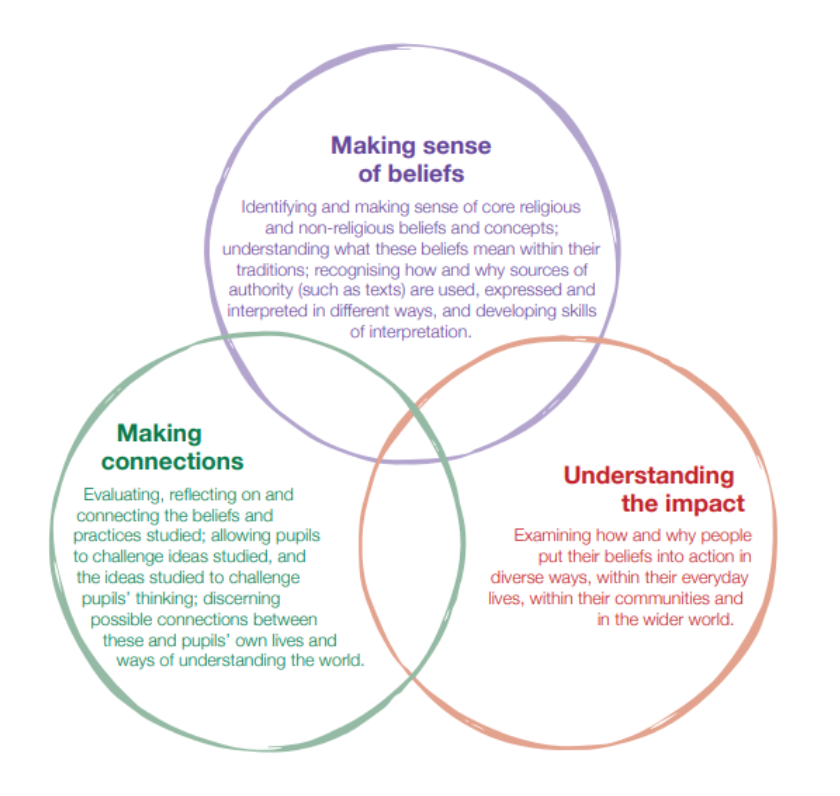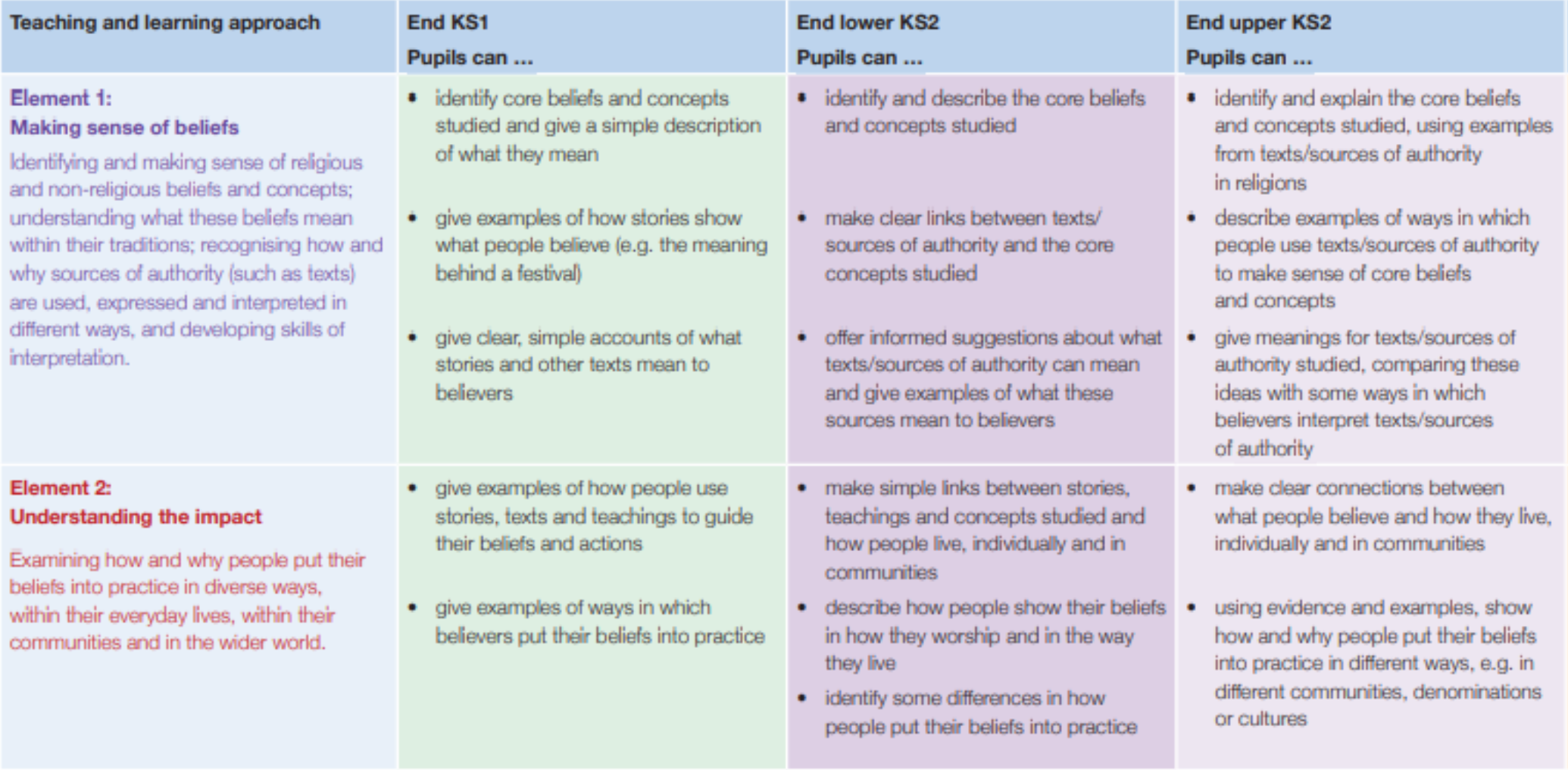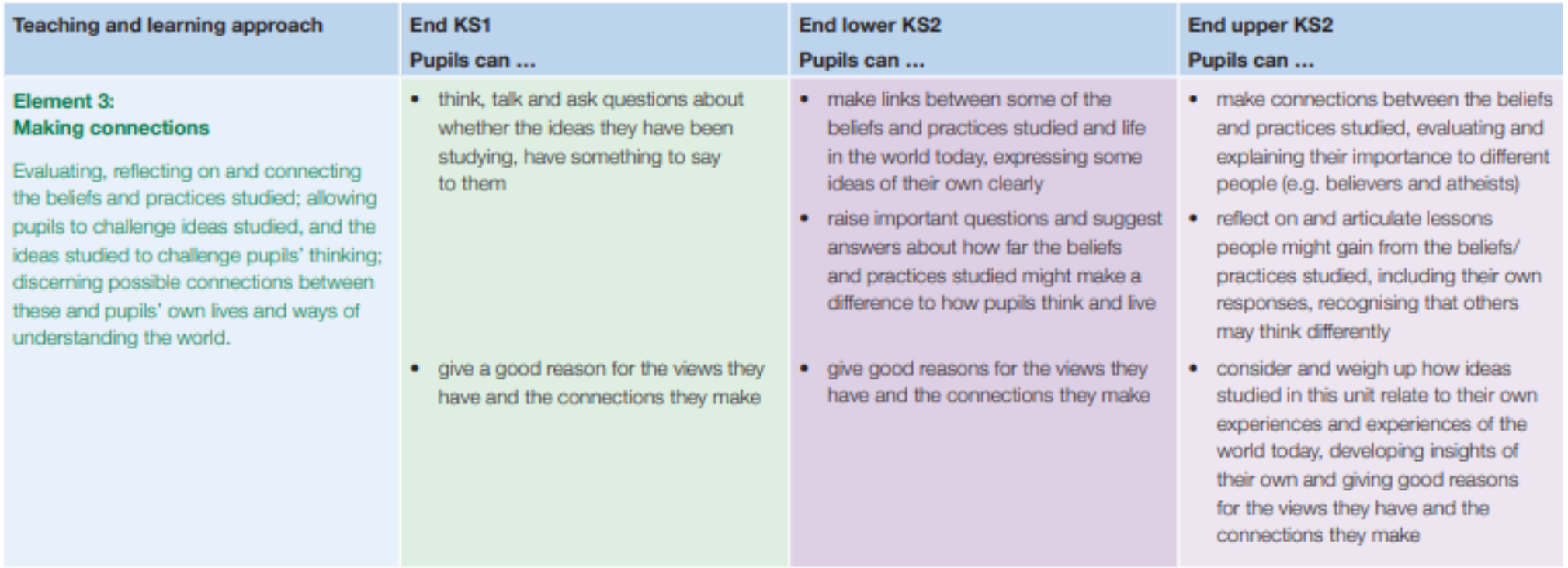This website uses cookies so that we can provide you with the best user experience possible. Cookie information is stored in your browser and performs functions such as recognising you when you return to our website and helping our team to understand which sections of the website you find most interesting and useful.
Religious Education
Contents
Religious Education Intent
Religious Education Implementation
Religious Education Impact
Religious Education Links with EYFS
Weston Lullingfields Religious Education Long Term Plan
End of Phase Outcomes
Religious Education Intent
Our RE lessons are intended to offer a broad and rich RE curriculum to allow for coverage of the areas prescribed; to allow for a variety of ways to explore religions, their community and personal development and wellbeing. The lessons have an intention of providing a high quality, coherent and progressive experience of the subject, with scope for cross-curricular learning. Through each unit, children will know about and understand a range of religions and world views. They will be able to identify, investigate and respond to a variety of issues. Making sense of belief, making connections and understanding the impact are featured throughout each strand and are there to ensure opportunities for children to develop positive attitudes and values and to reflect on and relate their learning in RE to their own experiences. The intent is to make sure that children understand the relevance of RE in today’s modern world and how it affects our lives.
Religious Education Implementation
At Weston Lullingfields we have adopted the Shropshire Agreed syllabus for RE 2021-2026 and the Understanding Christianity resources. Lessons offer a broad range of study for children and are based on a questioning approach. In KS1, children begin to look at Christianity and other religions, Judaism and Islam, focusing on celebrations and rituals. In KS2, we offer a wider range of learning opportunities about the world’s religions, Christianity, Judaism, Islam and Hinduism, including deeper understanding of the origin of those religions and their key stories and teachings. Throughout both key stages, emphasis on personal growth and community cohesion is evident, allowing for personal development for the children from KS1 to the end of KS2.
Religious Education Impact
We believe that the impact of using our lessons will be for children to have a better understanding of the religions that make up the UK landscape and how they can learn from and work alongside each other to create community cohesion. All children will be more informed about their position in the world, and the decisions they can make impacting their future. All children in school will be able to talk confidently about their wellbeing, moral and cultural development for the society in which they live. The RE curriculum will promote inquisitive minds, respect, tolerance and understanding for all those around them including themselves. Our lessons enable high quality work to be produced and evidenced, showcasing a deep understanding of the main religions of the world, their community and their future. This evidence will be seen through using the correct vocabulary, explanations and respectful opinions, as well as cross-curricular evidence, for example religious and cultural art work, drama, craft and presentations. Impact will be seen by all teachers and children enjoying the experience of teaching and learning RE and understanding how it can help them in their future.
Government Guidance
Religious Education is not a statutory part of the National Curriculum but state-funded, local authority schools must provide a basic curriculum. Schools designated as having a religious character are free to make their own decisions in preparing their syllabuses.
‘The curriculum for a maintained school must be a balanced and broadly based one which ‘promotes the spiritual, moral, cultural, mental and physical development of pupils and of society, and prepares pupils for the opportunities, responsibilities and experiences of later life’.’ Section 2 79 (1) School Standards and Framework Act.
Breadth and depth can be achieved in RE, if the following are taken into account:
- RE should provide opportunities for pupils to develop positive attitudes and values and to reflect and relate their learning in RE to their own experience.
- Building on the statutory requirements, it is recommended that there should be a wide- ranging study of religion and belief across the key stages as a whole.
- Not all religions need to be studied at the same depth or in each key stage, but all that are studied should be studied in a way that is coherent and promotes progression.
- Pupils should have the opportunity to learn that there are those who do not hold religious beliefs and have their own philosophical perspectives, and subject matter should facilitate integration and promotion of shared values.
- The study of religion should be based on the legal requirements and provide an appropriate balance between and within Christianity, other principal religions and, where appropriate, other religious traditions and worldviews, across the key stages as a whole, making appropriate links with other parts of the curriculum and its cross-curricular dimensions.
Taken from: Religious Education in English Schools: Non-statutory guidance 2010
Areas to Cover in the Non-Statutory Guidance
Our school follows the Shropshire Agreed syllabus for RE 2021-26 which has 3 interconnected elements – making sense of beliefs, making connections and understanding the impact
Our RE curriculum also incorporates:
- SMSC
- Personal Growth and Development
- Community Cohesion
- Beliefs and teachings (from various religions)
Understanding the key teachings of various religions. - Time to reflect and personal growth
Showing an appreciation for how religion plays an important role in people’s lives. Exploring identity and who we are. - Rituals, ceremonies and lifestyles (from various religions)
Exploring the day-to-day lives and practices of various religions. - Values (in your own life and others’ lives)
Showing an appreciation for what people value and how it is an important aspect of their life. Making sense of right and wrong and choices we make. - How beliefs are expressed
Understanding how books, scriptures, symbols, art and readings convey beliefs.
 RE coverage should aim to:
RE coverage should aim to:
- provoke challenging questions;
- encourage pupils to explore their own beliefs;
- enable pupils to build their sense of identity and belonging;
teach pupils to develop respect for others; - prompt pupils to consider their responsibilities.
Long Term Plan
| ACORN CLASS RECEPTION /YEAR 1/YEAR 2 | ||||||
| AUTUMN 1 | AUTUMN 2 | SPRING 1 | SPRING 2 | SUMMER 1 | SUMMER 2 | |
| EYFS | God
Why is the word ‘God’ so important to Christians? F1 Why is Harvest Festival important? |
Incarnation
Why is Christmas Special to Christians? F2 |
Being special: where do we belong? F4 | Salvation
Why is Easter special to Christians? F3 |
WhIch stories are special and why? F6 | Which places are special and why? F5 |
| YEAR A | God
What do Christians believe God is like? 1.1 |
Incarnation
Why does Christmas matter to Christians? 1.3 |
Who is Muslim and how do they live? 1.6
(God/Tawhid/ibadah/iman) |
Gospel
What is the ‘good news’ Christians believe Jesus brings? 1.4 |
How should we care for others and the world and why does it matter? 1.9
(repeated unit – deeper exploration) |
What makes some places sacred to believers? 1.8
(repeated unit – different context) |
| YEAR B | What does it mean to belong to a faith community?1.10 | What makes some places sacred to believers? 1.6
(repeated unit – different context) |
Who is Jewish and how do they live? 1.7
(God/Torah/people) |
Salvation
Why does Easter matter to Christians? 1.5 |
Creation
Who do Christians say made the world? 1.2 |
How should we care for others and the world and why does it matter?1.9
(repeated unit – deeper exploration) |
| OAK CLASS YEAR 3/4/5/6 | ||||||
| AUTUMN 1 | AUTUMN 2 | SPRING 1 | SPRING 2 | SUMMER 1 | SUMMER 2 | |
| YEAR A | Creation/Fall
What do Christians learn from the creation story? L2.1 (extend with U2.2) |
God/Incarnation
What is the trinity and why is it important to Christians? L2.3 |
How do festivals and worship show what matters to a Muslim?
L2.9 |
Gospel
What kind of world did Jesus want? L2.4 |
What does it mean to be Hindu in Britain today? L2.8 | How and why do
people try and make the world a better place? L2.12 |
| YEAR B | People of God
What is it like for someone to follow God? L2.2 |
What do Hindus believe God is like? L2.7 | God/Torah/ People/ the Land
How do festivals and family life show what matters to Jewish people? L2.10 |
Salvation
Why do Christians call the day Jesus died ‘Good Friday’? L2.5 |
Kingdom of God
For Christians what was the impact of Pentecost? L2.6 |
How and why
do people mark the significant events of life? L2.11 |
| YEAR C | Creation
Creation and science: conflicting or complementary? U2.2 (Recap L2.1) |
God
What does it mean if Christians believe God is holy and loving? U2.1 |
What does it mean to be a Muslim in Britain today? U2.8
(Recap L2.9)
|
Salvation
What difference does the resurrection make for Christians? (UC unit) (recap L2.5) |
Why do Hindus want to be good?
U2.7 (Recap L2.8) |
What matters
most to Humanists and Christians? U2.10 |
| YEAR D | People of God
How can following God bring freedom and justice? (UC unit) |
Incarnation
Why do Christians believe Jesus was the messiah? U2.3 |
Why is the Torah so important to Jewish people? U2.9
(Recap L2.10) |
Salvation
What do Christians believe Jesus did to ‘save’ people? U2.5 Kingdom of God For Christians, what kind of King is Jesus? U2.6 |
Why do some
people believe in God and some people not? U2.11 |
How can faith
help people when life gets hard? U2.12 Gospel How do Christians decide how to live? ‘What would Jesus do?’ U2.4 |
End of phase outcomes
Each of the three elements of the teaching and learning approach is important and pupils should make progress in all of them. Below are the end of phase outcomes for each element. Each unit provides learning outcomes specific to each question, leading to these end of phase outcomes.


The principal aim of religious education
The principal aim of religious education is to explore what people believe and what difference this makes to how they live, so that pupils can gain the knowledge, understanding and skills needed to handle questions raised by religion and belief, reflecting on their own ideas and ways of living. The threefold aim of RE elaborates the principal aim. The curriculum for RE aims to ensure that all pupils:
1. make sense of a range of religious and non-religious beliefs, so that they can:
- identify, describe, explain and analyse beliefs and concepts in the context of living religions, using appropriate vocabulary
- explain how and why these beliefs are understood in different ways, by individuals and within communities
- recognise how and why sources of authority (e.g. texts, teachings, traditions, leaders) are used, expressed and interpreted in different ways, developing skills of interpretation
2. understand the impact and significance of religious and non-religious beliefs, so that they can:
- examine and explain how and why people express their beliefs in diverse ways
- recognise and account for ways in which people put their beliefs into action in diverse ways, in their everyday lives, within their communities and in the wider world
- appreciate and appraise the significance of different ways of life and ways of expressing meaning
3. make connections between religious and non-religious beliefs, concepts, practices and ideas studied, so that they can:
- evaluate, reflect on and enquire into key concepts and questions studied, responding thoughtfully and creatively, giving good reasons for their responses
- challenge the ideas studied, and allow the ideas studied to challenge their own thinking, articulating beliefs, values and commitments clearly in response
- discern possible connections between the ideas studied and their own ways of understanding the world, expressing their critical responses and personal reflections with increasing clarity and understanding
Throughout schooling, teachers should consider how their teaching contributes towards the principal aim of RE in Shropshire, and how they help pupils to achieve the threefold aims above.

